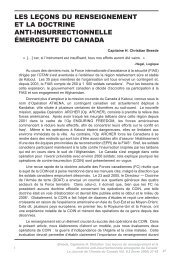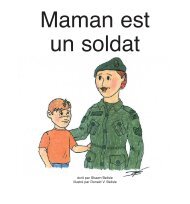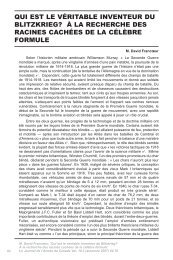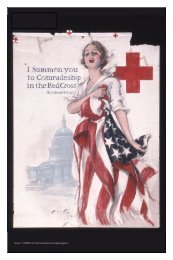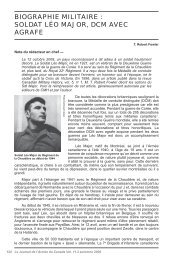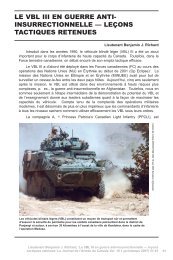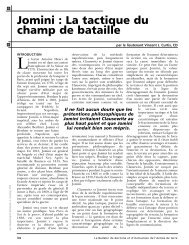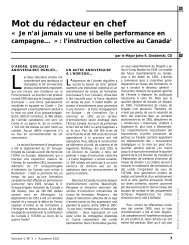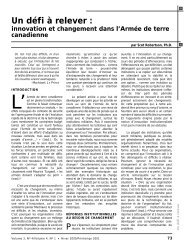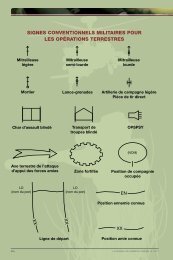The Canadian Army Journal
The Canadian Army Journal
The Canadian Army Journal
You also want an ePaper? Increase the reach of your titles
YUMPU automatically turns print PDFs into web optimized ePapers that Google loves.
We fight them with schools, education, information, ideas, confidence,<br />
individual self-reliance, and overwhelming force on tap when needed. 75<br />
About the Author…<br />
Major Strickland is currently a student at the Joint Command and Staff Program at CFC<br />
Toronto. Previously, he was the G3 of 1 CMBG and the Deputy Commanding Officer of 1 PPCLI,<br />
with whom he deployed to Kandahar Province in 2006. He is currently completing his Masters of<br />
Defence Studies as well as a Masters in Middle Eastern History.<br />
Endnotes<br />
1. Some will argue that the Taliban are “state-based” in that they briefly held power in Afghanistan and formed an<br />
internationally recognized state power. This position is inherently weak, in that recognition was offered by only three other<br />
states within the international arena, and because (as will be shown) the Taliban were initially formed on a tribal basis, and<br />
were later augmented by recruits from numerous different states. Additionally, their activities lack the sanction of any state<br />
while concurrently being conducted across international borders.<br />
2. Accessed on 22 June 2007 at http://www.pnm.my/mtcp/images/maps/Afghanistan-map.jpg<br />
3. For complete general details, it is recommended that the reader see the Afghanistan Country Handbook. (United<br />
States Department of Defence. Afghanistan Country Handbook. Np: Government Printing Office, October 2003).<br />
4. Afghanistan Country Handbook, 59.<br />
5. For a more detailed synopsis of the Afghan-Soviet War, and indeed the tumultuous history of the country from its<br />
formation, Victoria Scholfield’s work Afghan Frontier: Feuding and Fighting in Central Asia (Victoria Schofield, Afghan<br />
Frontier: Feuding and Fighting in Central Asia (London: Taurus Park, 2003)) is highly recommended.<br />
6. Kathy Gannon, I is for Infidel: From Holy War to Holy Terror: 18 Years Inside Afghanistan (New York: Public Affairs,<br />
2005), 9.<br />
7. Barnett R. Rubin, “Afghanistan Under the Taliban.” Current History (February 1999): 80.<br />
8. David B. Edwards, Before Taliban: Genealogies of the Afghan Jihad (Los Angeles: University of California Press,<br />
2002), 272.<br />
9. Barnett R. Rubin, 80.<br />
10. Gannon, 25.<br />
11. Ahmed Rashid, Taliban: Militant Islam, Oil and Fundamentalism in Central Asia (London: Yale University Press, 2000),<br />
25.<br />
12. Charles Allen, God’s Terrorists: <strong>The</strong> Wahhabi Cult and the Roots of Modern Jihad (London: Abacus, 2006), 290.<br />
13. Ibid, 3.<br />
14. Ibid, 4.<br />
15. Gannon, 27-29.<br />
16. Barnett R. Rubin, 79.<br />
17. John L. Esposito, Unholy War: Terror in the Name of Islam (New York: Oxford University Press, 2002), 16.<br />
18. Michael Rubin, “Who is Responsible for the Taliban?” Middle East Review of International Affairs. (Volume 6,<br />
Number 1, March 2002): 9. Accessed on 20 June 2007 at http:meria.idc.ac.il/journal/2002/issue1/jv6n1a1.html.<br />
19. John C. Griffiths, Afghanistan: A History of Conflict (London: Carlton Books, 2001), 227.<br />
20. Ibid.<br />
21. Burnett R. Rubin, 80.<br />
22. Gannon, 86.<br />
23. Burnett R. Rubin, 79-80.<br />
24. Ibid.<br />
25. A complete account of this incident is beyond the scope or aims of this paper. Interested readers are strongly<br />
encouraged to read Steve Coll’s Ghost Wars (Coll, Steve. Ghost Wars: <strong>The</strong> Secret History of the CIA, Afghanistan, and<br />
Bin Laden, From the Soviet Invasion to September 10, 2001. New York: Penguin, 2005).<br />
26. Michael Ignatieff, Empire Lite: Nation-Building in Bosnia, Kosovo and Afghanistan (Toronto: Penguin, 2003), 86.<br />
27. Ibid.<br />
28. Rashid, 13.<br />
29. Burnett R. Rubin, 80.<br />
30. Robert Fisk, <strong>The</strong> Great War for Civilisation: <strong>The</strong> Conquest of the Middle East. (London: Harper Collins, 2005), 31.<br />
31. Rashid, 32.<br />
32. Esposito, 17.<br />
33. Edwards, 294.<br />
34. Gannon, 33.<br />
35. Allen, 274.<br />
36. Michael Rubin, 13.<br />
37. Allen, 275.<br />
<strong>Canadian</strong> <strong>Army</strong> <strong>Journal</strong> Vol. 11.1 Spring 2008<br />
63


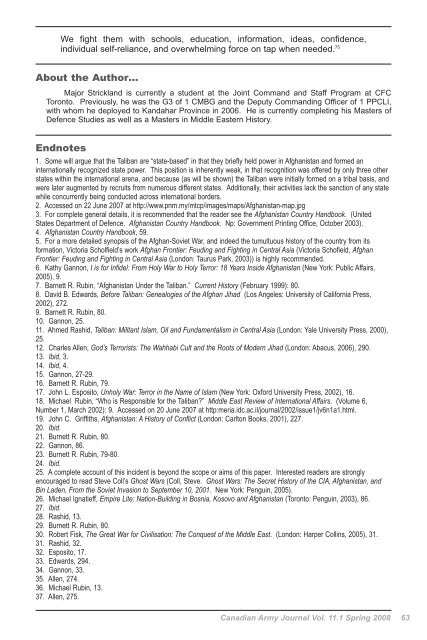
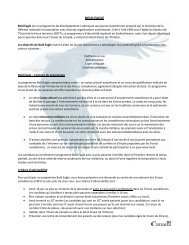
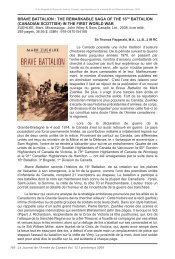
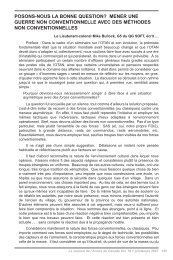
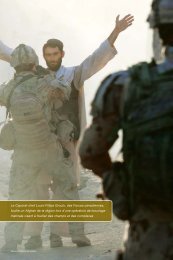
![La modularite dans l'Armee de terre canadienne [pdf 1.6 MB]](https://img.yumpu.com/17197737/1/188x260/la-modularite-dans-larmee-de-terre-canadienne-pdf-16-mb.jpg?quality=85)
